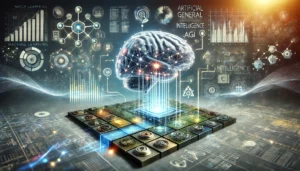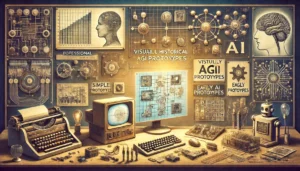AGI Understanding Artificial General Intelligence: A Comprehensive Guide

Artificial General Intelligence (AGI) is a big step forward in the world of artificial intelligence. Unlike regular AI, which can only do specific tasks, AGI aims to think and learn like a human. This guide will take you through the history, current state, and future of AGI. We’ll also look at the challenges and exciting possibilities that come with it.
Key Takeaways for Artificial General Intelligence
- AGI is different from regular AI because it aims to think and learn like a human.
- The journey to AGI has many important milestones and ongoing research efforts.
- Developing AGI comes with technical, ethical, and safety challenges.
- AGI has the potential to revolutionise fields like healthcare, education, and industry.
- Understanding AGI helps us prepare for its impact on jobs, privacy, and society.
The Evolution of Artificial General Intelligence
Artificial General Intelligence: Historical Background
Artificial General Intelligence (AGI) has a rich history that dates back to the mid-20th century. Pioneers like Alan Turing laid the groundwork for machine intelligence. During the 1980s and 1990s, rule-based and expert systems marked significant milestones. The 21st century brought a shift with advancements in machine learning, especially neural networks and deep learning. These developments paved the way for AGI, aiming to mimic human cognitive abilities across various fields.
Key Milestones in AGI Development
- 1950s: Alan Turing introduces the concept of machine intelligence.
- 1980s-1990s: Emergence of rule-based and expert systems.
- 2000s: Rise of neural networks and deep learning.
- 2022: Generative AI models like ChatGPT demonstrate advanced capabilities.
Current State of AGI Research
Today, AGI research is a collaborative effort involving scientists, engineers, and ethicists. Companies like OpenAI and DeepMind are at the forefront, investing in machine learning models and algorithm optimisation. Despite impressive advancements, AGI is not yet fully autonomous. Human oversight remains crucial to mitigate potential risks and ensure ethical considerations are met.
The journey to AGI is ongoing, with each milestone bringing us closer to machines that can think and learn like humans.
Defining Artificial General Intelligence
Characteristics of AGI
Artificial General Intelligence (AGI) is designed to mimic human cognitive abilities. Unlike narrow AI, which excels at specific tasks, AGI aims to understand, learn, and apply knowledge across a wide range of activities. AGI systems are expected to have a high level of self-understanding and autonomous self-control. They should be able to solve complex problems in various contexts and learn to tackle new challenges they weren’t initially programmed to handle.
Differences Between AGI and Narrow AI
The primary difference between AGI and narrow AI lies in their scope and flexibility. Narrow AI, also known as weak AI, is designed for specific tasks like image recognition or language translation. In contrast, AGI aims to achieve a more general form of intelligence, similar to human cognitive abilities. While narrow AI can outperform humans in its specialised area, it lacks the cognitive flexibility that AGI aspires to achieve.
| Feature | Narrow AI | AGI |
|---|---|---|
| Scope | Specific tasks | General tasks |
| Flexibility | Low | High |
| Learning Ability | Limited | Extensive |
Common Misconceptions About Artificial General Intelligence
There are several misconceptions about AGI that need to be addressed. One common myth is that AGI will be just an advanced version of narrow AI. However, AGI is fundamentally different in its ability to generalise knowledge and adapt to new situations. Another misconception is that AGI will be developed soon. While research is ongoing, we are still far from achieving true AGI. It’s also important to note that AGI is not just about creating smarter machines but about developing systems that can think and learn like humans.
Understanding the nuances between AGI and narrow AI is crucial for grasping the future potential and limitations of artificial intelligence. AGI aims to transcend the boundaries of specialised tasks, offering a more holistic approach to machine intelligence.
Theoretical Approaches to AGI
Machine Learning and AGI
Machine learning is a key player in the quest for AGI. We use algorithms that learn from data to make predictions or decisions. This approach mimics how humans learn from experience. However, it has its limits. For instance, machine learning models often need vast amounts of data to perform well. They also struggle with tasks that require common sense or deep understanding.
Symbolic AI and AGI
Symbolic AI focuses on using symbols and logical rules to represent knowledge and reasoning processes. These systems can manipulate symbols to solve problems and make inferences. Yet, scaling symbolic reasoning to handle the real world’s complexity is a significant challenge. Symbolic AI systems often lack the flexibility needed to adapt to new situations.
Hybrid Models
Many researchers believe that combining different approaches might be the key to achieving AGI. Hybrid models integrate symbolic reasoning with machine learning or combine embodied AI with deep learning techniques. This blend aims to leverage the strengths of each method while mitigating their weaknesses. For example, a hybrid model could use machine learning to handle large datasets and symbolic AI for logical reasoning.
The journey towards AGI is still in its early stages. Each approach has its strengths and weaknesses, and the most successful path might involve a combination of these techniques. As research progresses, understanding the nature of intelligence itself will be crucial for unlocking the true potential of AGI.
Challenges in Developing Artificial General Intelligence
Technical Hurdles
Creating AGI is no small feat. One of the biggest challenges is scalability. Our current AI models often struggle to handle vast amounts of data and complex tasks as they grow. This means we need to develop systems that can expand without losing their effectiveness.
Another major hurdle is learning and generalisation. Unlike narrow AI, AGI must learn from a wide range of experiences and apply this knowledge to new situations. This requires advanced learning algorithms that can generalise from limited data and transfer knowledge across different domains.
Ethical Considerations
Ethics play a crucial role in AGI development. We must ensure that AGI systems are designed to make decisions that align with human values. This includes addressing issues like data privacy, algorithmic bias, and transparency. It’s essential to build trust in AGI systems to ensure they are used responsibly.
Safety and Control
Safety and control are paramount when it comes to AGI. We need to ensure that AGI systems behave predictably and align with our values. This involves creating robust control mechanisms to prevent unexpected outcomes. The challenge is to balance innovation with safety to avoid potential risks.
Developing AGI is a complex journey filled with technical, ethical, and safety challenges. However, by addressing these issues, we can pave the way for a future where AGI benefits all of humanity.
Potential Applications of AGI
Healthcare Innovations
Artificial General Intelligence (AGI) has the potential to transform healthcare. Imagine AGI analysing a patient’s medical history, genetic data, and real-time health information to create personalised treatment plans. This could lead to early detection of diseases and more effective treatments. AGI could revolutionise diagnostics and treatment planning, making healthcare more efficient and tailored to individual needs.
Educational Advancements
In education, AGI can create customised learning experiences for each student. By understanding a student’s learning style and pace, AGI can adapt lessons to fit their needs. This personalised approach can help students grasp complex concepts more easily and improve overall educational outcomes. Additionally, AGI can assist teachers by providing insights into student performance and suggesting targeted interventions.
Industrial Automation
Artificial General Intelligence can significantly enhance industrial automation. With its ability to learn and adapt, AGI can optimise manufacturing processes, reduce downtime, and improve product quality. In logistics, AGI can streamline supply chain operations, predicting demand fluctuations and ensuring efficient delivery of goods. This can lead to cost savings and increased productivity for businesses.
The integration of AGI into various sectors promises to bring about significant improvements in efficiency, personalisation, and innovation.
Ethical and Societal Implications of AGI
Impact on Employment
As AGI becomes more advanced, it could change the job market in big ways. Some jobs might disappear, while new ones could be created. We need to think about how to help people learn new skills and find new jobs. It’s important to plan ahead so that everyone can benefit from these changes.
Privacy Concerns
AGI systems will have access to a lot of personal data. This raises questions about how this data will be used and protected. We must ensure that AGI respects user privacy and follows the law. Strong rules and protections are needed to keep our data safe.
Bias and Fairness
AGI can sometimes make decisions that are unfair or biased. This can happen if the data it learns from is not balanced. We need to make sure that AGI systems are fair and do not repeat old biases. This means using diverse data and checking for fairness throughout the development process.
We must work together to address these ethical and societal challenges. By doing so, we can ensure that AGI benefits everyone and does not cause harm.
Google ads audit
A Google ads audit can help businesses improve their online presence. By reviewing and optimising their ads, companies can reach more customers and increase sales. This is especially important in a world where AGI is changing how we do business.
AGI and the Future of Work
Job Displacement
The rise of AGI could lead to significant changes in the job market. Many roles that are repetitive or data-driven might be automated, causing job displacement in various sectors. However, this doesn’t mean the end of employment. New job opportunities will emerge, especially in fields that require human creativity and emotional intelligence. We must invest in education and training to help workers transition to these new roles.
New Career Opportunities
With AGI taking over mundane tasks, we can focus on more complex and creative work. This shift will open up new career opportunities in areas like AI ethics, AGI system management, and human-AI collaboration. The key is to stay adaptable and continuously update our skills to meet the demands of the evolving job market.
Skills for the AGI Era
To thrive in an AGI-driven world, we need to develop a new set of skills. These include:
- Critical thinking and problem-solving
- Emotional intelligence
- Creativity and innovation
- Technical skills related to AGI and machine learning
By focusing on these areas, we can ensure that we remain relevant and valuable in the workforce.
The future of work with AGI is not just about surviving but thriving. By embracing change and focusing on continuous learning, we can turn potential challenges into opportunities.
Artificial General Intelligence in Popular Culture
AGI in Literature
Artificial General Intelligence has long been a fascinating subject in literature. From classic science fiction novels to modern-day thrillers, AGI often takes centre stage. Authors explore the potential and pitfalls of AGI, imagining worlds where machines think and act like humans. These stories not only entertain but also provoke thought about our future with intelligent machines.
AGI in Film and Television
Films and TV shows have brought AGI to life in vivid detail. From the friendly robots in family movies to the more sinister AI in dystopian tales, AGI characters captivate audiences. They make us question the boundaries between human and machine intelligence. Some of the most iconic AGI characters have become cultural touchstones, influencing how we perceive real-world AI advancements.
Public Perception of AGI
Public perception of AGI is shaped by its portrayal in media. While some view AGI as a technological marvel that can solve many of our problems, others fear it as a potential threat. This duality is often reflected in news stories and public debates. It’s crucial to engage with these perceptions to foster a balanced understanding of AGI’s potential and risks.
As we continue to develop AGI, it’s essential to consider how it is represented in popular culture. These representations can influence public opinion and policy decisions, making it vital to portray AGI accurately and thoughtfully.
Preparing for an AGI Future
Educational Resources
To get ready for the future with AGI, we need to start with education. There are many online platforms like Coursera and edX that offer courses on machine learning and artificial intelligence. These courses cover the basics and help us understand the foundational concepts of AGI. Additionally, Springer provides access to AGI conference proceedings and theoretical foundations, which are great for deeper learning.
Policy and Regulation
Creating policies and regulations is crucial for the safe development of AGI. Governments and organisations must work together to set guidelines that ensure AGI systems are used responsibly. This includes addressing issues like privacy, bias, and fairness. By establishing clear rules, we can make sure AGI benefits everyone and doesn’t cause harm.
Public Awareness and Engagement
Raising public awareness about AGI is essential. People need to know what AGI is and how it can impact their lives. We can do this through workshops, seminars, and public talks. Engaging with the community helps build trust and ensures that everyone is informed about the potential and risks of AGI.
Preparing for an AGI future is not just about technology; it’s about people, policies, and education working together.
In summary, getting ready for AGI involves a mix of education, policy-making, and public engagement. By focusing on these areas, we can ensure a smooth transition into a future where AGI plays a significant role.
Case Studies and Real-World Examples
Early AGI Prototypes
In the early days of AGI research, several prototypes were developed to test the waters. These initial models were rudimentary but laid the groundwork for future advancements. For instance, early AGI systems could perform basic tasks but lacked the ability to generalise across different domains. These prototypes were crucial in understanding the limitations and potential of AGI.
Successful Implementations
As research progressed, we saw more successful implementations of AGI. One notable example is the development of AGI systems that can assist in ecommerce PPC campaigns. These systems can analyse vast amounts of data to optimise ad spend and maximise return on investment (ROI). This has revolutionised the way businesses approach online advertising.
Lessons Learned
From these case studies, we have learned valuable lessons. One key takeaway is the importance of continuous improvement and adaptation. AGI systems must be regularly updated to keep up with changing data and user needs. Another lesson is the need for robust ethical guidelines to ensure that AGI is used responsibly. These lessons will guide future research and development in the field of AGI.
The journey of AGI development is a testament to human ingenuity and the relentless pursuit of knowledge. Each step forward brings us closer to realising the full potential of artificial general intelligence.
The Road Ahead for AGI
Predictions and Timelines
As we look to the future, the journey towards Artificial General Intelligence (AGI) is both exciting and uncertain. Experts predict that we might see significant advancements in the next few decades. However, the exact timeline remains a topic of debate. Some believe we could achieve AGI within 20 to 30 years, while others argue it might take much longer. The key is to continue our research and development efforts, ensuring we are prepared for the challenges and opportunities that lie ahead.
Ongoing Research
Current research in AGI is diverse and multifaceted. Scientists and engineers are exploring various approaches, from machine learning to symbolic AI. Each method offers unique insights and potential solutions. For instance, machine learning focuses on data-driven models, while symbolic AI emphasises logic and reasoning. By combining these approaches, we can develop more robust and versatile AGI systems. It’s crucial to stay updated with the latest findings and breakthroughs in this rapidly evolving field.
Collaborative Efforts
The development of AGI is not a solitary endeavour. It requires collaboration across disciplines and industries. Universities, research institutions, and tech companies are working together to push the boundaries of what is possible. Initiatives like open-source projects and international conferences foster a spirit of cooperation and knowledge sharing. By pooling our resources and expertise, we can accelerate the progress towards AGI and ensure it benefits all of humanity.
The road to AGI is long and winding, but the ongoing research and advancements in various approaches offer a glimmer of hope.
In conclusion, the future of AGI is filled with promise and potential. By staying committed to our goals and working together, we can navigate the challenges and seize the opportunities that AGI presents.
Artificial General Intelligence (AGI) is the next big thing in technology. It promises to change our world in ways we can’t even imagine. But what does the future hold for AGI? Don’t miss out on the opportunity to stay ahead in the tech game!
Artificial General Intelligence: Conclusion
Artificial General Intelligence (AGI) is a long-term goal in AI development, but current enterprise applications rely on structured data and machine learning models. Platforms like Dataiku enable businesses to harness AI today, providing tools for data preparation, model training, and scalable deployment.
Artificial General Intelligence (AGI) stands as a beacon of future technological advancement. While we have made significant strides in AI, AGI promises to take us even further by mimicking human intelligence in a more general and adaptable way. This journey towards AGI is filled with both exciting possibilities and complex challenges. As we continue to explore and develop AGI, it is crucial to approach it with a balanced perspective, considering both its potential benefits and the ethical implications. The path to AGI is not just about technological innovation but also about understanding and shaping the future of our relationship with intelligent machines. As we move forward, let us embrace the promise of AGI with curiosity, caution, and a commitment to harnessing its power for the greater good.
Frequently Asked Questions for Artificial General Intelligence
What is Artificial General Intelligence (AGI)?
Artificial General Intelligence (AGI) is a type of AI that can understand, learn, and apply knowledge across a wide range of tasks, much like a human can. Unlike narrow AI, which is designed to perform specific tasks, AGI aims to exhibit general cognitive abilities.
How is AGI different from narrow AI?
Narrow AI is designed to perform specific tasks, like recognising faces or playing chess. AGI, on the other hand, can learn and adapt to new situations, solving a variety of problems without needing extra programming.
Are there any real Artificial General Intelligence systems today?
As of now, no true AGI systems exist. They are still a concept and remain the stuff of science fiction. Researchers are working on it, but we haven’t achieved it yet.
What are the main challenges in developing AGI?
Developing AGI comes with many challenges, including technical hurdles, ethical considerations, and ensuring safety and control. Researchers need to solve these issues before AGI can become a reality.
What could AGI be used for?
AGI has the potential to be used in many fields, such as healthcare, education, and industrial automation. It could revolutionise these industries by performing complex tasks that currently require human intelligence.
Will AGI take away jobs?
AGI might lead to job displacement in some areas, but it could also create new career opportunities. People may need to learn new skills to adapt to the changes brought by AGI.
What ethical concerns are associated with AGI?
Ethical concerns related to AGI include its impact on employment, privacy issues, and ensuring that the technology is fair and unbiased. It’s important to address these concerns as we develop AGI.
How can we prepare for an AGI future?
Preparing for an AGI future involves educating the public, creating policies and regulations, and raising awareness about the technology. It’s important to engage with these aspects to ensure a smooth transition to an AGI-driven world.
Author
Search Blog
Free PPC Audit
Subscribe to our Newsletter
The Voices of Our Success: Your Words, Our Pride
Don't just take our word for it. With over 100+ five-star reviews, we let our work-and our satisfied clients-speak for us.
"We have been working with PPC Geeks for around 6 months and have found Mark and the team to be very impressive. Having worked with a few companies in this and similar sectors, I rate PPC Geeks as the strongest I have come across. They have taken time to understand our business, our market and competitors and supported us to devise a strategy to generate business. I value the expertise Mark and his team provide and trust them to make the best recommendations for the long-term."
~ Just Go, Alasdair Anderson




